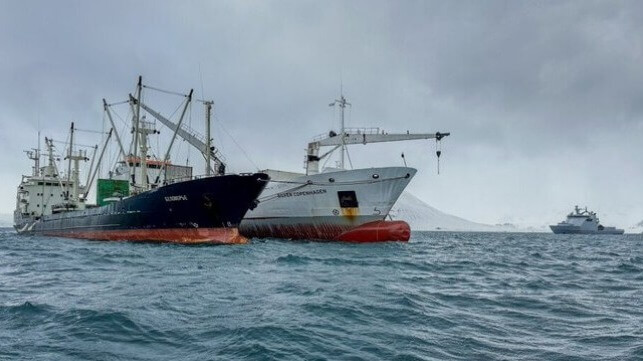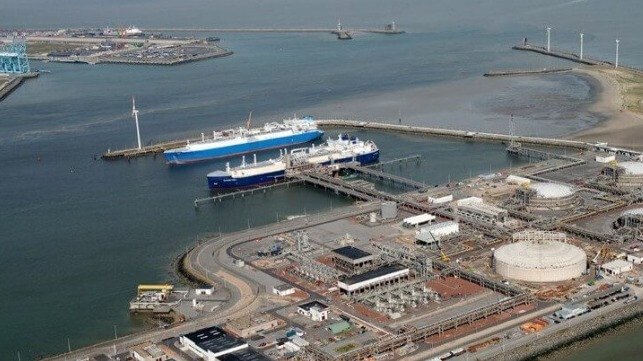Russia Transshipping Fish Through Norway to Avoid Dutch Shipping Ban

There has been extensive reporting on Russia’s use of transshipping with ship-to-ship transfers of oil in secluded locations, but now comes a report from the Norwegian public broadcaster NRK of ship-to-ship transfers of frozen fish. While pointing out that it is technically not a violation of the EU sanctions against Russia, the action appears to be taking place to avoid a Dutch ban on Russian shipping.
The fish, likely cod from the Barents Sea, have become caught in political issues and geopolitics with the fears sweeping across Europe. The Dutch banned Russian-flagged vessels with the report saying it was due to a fear of spying and espionage. They also cite Russia’s military doctrine pronounced after the 2022 invasion of Ukraine that would permit the use of civilian vessels by the military.
The Russian company Norebo has the highest fishing quotas for cod in the Barents Sea NRK reports but is facing problems with the export and delivery of its catch. The reports are that its vessels are being blocked from the port of Eemshaven in the Netherlands. The company had been exporting to the Netherlands with the Dutch being the largest market for its catch. NRK says over 130,000 tonnes of Russian seafood was landed in the Netherlands in 2023.
The fishing vessel Belomorye had been at sea for more than 16 days without landing its catch and was unable to proceed as it would normally have to Eemshaven. Instead, NRK reports the vessel was sighted in a deserted fjord on Svalbard last month.
The Norwegian Coast Guard was monitoring the activity and confirmed that it inspected the vessel for any potential violations in May. The Belomorye was seen in a photo released by Kystvakten (the Norwegian Coast Guard’s account) alongside the Norwegian freeze ship Silver Copenhagen.
According to the report, 2,000 tonnes of frozen fish were transferred ship-to-ship from the Russian vessel to the Norwegians. The vessel is operated by a Norwegian company Silver Sea which reports it has a 20-year relationship with Norebo. They contend that everything was being done legally. They received the catch and transferred it to the customers in the Netherlands.
Officials confirmed that fish are not part of the EU sanctions. Dutch authorities also confirmed their position that the fish were a legal import and had no problems landing it from the Norwegian ship after a delay of several weeks.
Russia is reported to have increased its fish exports in 2023 by 12 percent. Total exports were 2.2 million tons.
EU Imposes Small-Scale Sanctions on Russian LNG Exports

The EU's member states have agreed to roll out the bloc's first-ever sanctions on Russian LNG, though the impact on trade volume is expected to be minimal.
Diplomats with inside knowledge of the talks say that the 14th package of EU sanctions will ban Russian LNG re-exports from European ports. Novatek uses ports in France and Belgium to transload and re-export LNG from its Yamal project to markets overseas, like China. The use of EU infrastructure allows Novatek to shorten the voyages of its unique icebreaking LNG carriers, freeing them up for more trips to and from Yamal.
However, EU-based transloading and re-export activity represents a small fraction of Russian LNG shipping, according to analysts at Atlas Network. European utilities will still be able to purchase and import Novatek's Russian LNG for local consumption, continuing a trend that began when Russian pipeline gas was cut off in 2022. The likely outcome, according to Atlas, is that the small fraction of Russian LNG that used to be re-exported will now remain in Europe. In this scenario, Novatek and its trading partners would likely use locational swap agreements with non-Russian LNG producers in order to fulfill contractual obligations for re-export cargoes.
The package also bans European financing for three Russian LNG export terminal projects, diplomats told Reuters. It also adds more Russian "dark fleet"s tankers to the list of EU-sanctioned vessels.
The details of the sanctions agreement have not yet been released, but EU leaders said that the overall package would have a substantial impact. It is the EU's 14th set of Russian sanctions measures since the invasion of Ukraine in 2022.
"This hard-hitting package will further deny Russia access to key technologies," European Commission President Ursula von der Leyen said in a statement. "It will strip Russia of further energy revenues and tackle Putin’s shadow fleet and shadow banking network abroad."
"This package provides new targeted measures and maximizes the impact of existing sanctions by closing loopholes," the Belgian presidency of the European Council said in a brief statement.
The package omits a long-discussed element that would have required the overseas subsidiaries of EU companies to stop re-exports of their goods to Russia. Moscow's weapons developers have had few problems gaining access to Western high-tech components for missile guidance systems, navigation equipment and other key defense technology, in part because sanctions can be easily evaded by routing shipments through third countries like Kazakhstan or China. The proposed limit on European-owned subsidiaries would have closed a loophole, but the German government objected, fearing that it would damage small German businesses. Ultimately this measure was dropped, diplomats told Euractiv and Politico.
No comments:
Post a Comment